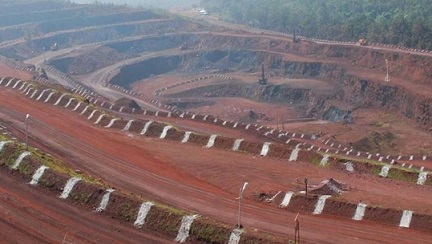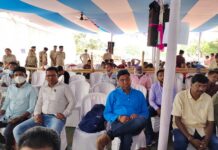By Our Correspondent
BHUBANESWAR: Of the 13 technically qualified bidders, Serajuddin & Co, ArcelorMittal India Pvt Ltd, JSW Steel, Adani Enterprises Ltd and Rungta Mines Ltd are in the final race for one of India’s largest iron ore mines, Balda in Keonjhar.Balda Block Iron ore is being held by Mines of Ms Serajuddin & co.
One of India’s largest iron ore mines, Balda in Keonjhar has an estimated ore reserve of 200.11 million tonne. The mine has a capacity to produce 15.5 million tonnes of iron ore a year.
In October last year, the Directorate of Mines had invited tenders for 16 mineral blocks cleared by the high-level committee of the Odisha government for auction.
JSW Steel had bagged two mines — Nuagaon and Narayanposhi — with a total reserve of 980 million tonnes, ArcelorMittal India Pvt Ltd won the third iron ore mine notified for auction in Odisha on Monday.
Meanwhile, Sajjan Jindal of JSW Steel has the last laugh. Even Jindal’s younger brother Naveen Jindal had seen the market capitalisation of his Jindal Power & Steel going through the roof in 2008, thanks to its power business and considerable mining assets.
Yes, in the last two years, JSW Steel had made some progress. Through auctions in Karnataka, it now owns six iron ore mines in the state. But these are small, with a combined annual production of up to eight million tonne. They would meet about 35 percent of the company’s iron ore needs.
But on January 31, even as rest of the India Inc was busy reading the details of Economic Survey and looking forward to the Union Budget, news came that JSW Steel had won the Nuagaon mine in Odisha.
It was a major victory. JSW Steel had outbid scores of other competitors, including ArcelorMittal, Tata Steel and the Adani Group. The mine was the largest among those was on the block, with a reserves of around 790 MT. That is higher than the combined reserves of rest of the mines on offer.
These mines were auctioned by the state, ahead of March 31, when their leases would have expired.There was more for Jindal. On February 2, news reported that JSW Steel had bagged one more mine in the auction. This was the Narayanposhi iron block with reserves of 190 MT.Put together, JSW Steel now has access to about a billion tonne of iron ore.
“Both wins in Odisha, will give JSW Steel an annual supply of around 22 MT of captive iron ore for its plants. The C-category mines in Karnataka are now fully operational. So, around 30 MT of iron ore are now readily available to meet the company’s requirements,” said a senior industry executive.
The mines now make the steelmaker nearly, completely self-sufficient in its iron ore needs, as it can immediately start sourcing the raw material from the Odisha mines, which are operational.
To produce a tonne of steel, around 1.5 to 1.6 tonne of iron ore is needed.But Jindal can’t sit easy, not yet.He is currently expanding JSW Steel’s capacity. Later this year, 5 MT of additional capacity will come into use at the company’s Dolvi facility. And if its acquisition of Bhushan Power & Steel materialises, then that will add another 3.5 MT of steel capacity. These will increase its iron ore requirement.
Can Jindal win a few more mines from the auctions in Odisha? In total, 18 mines are being auctioned. Though he has already got control of the jewel of the lot, the remaining mines have a combined reserves of about 500 MT. He will surely try to get as many as possible.
Also, JSW Steel doesn’t have coal mines, either. On the other hand, Tata Steel has enough to meet at least half of its coal requirement. Jindal would be looking to bridge this gap too.






















